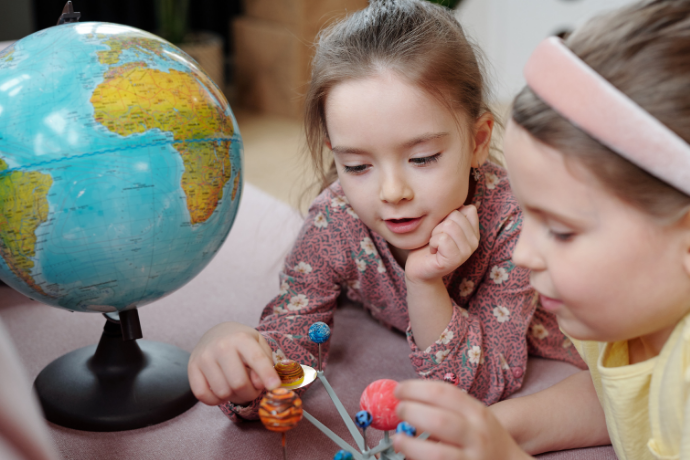 SPEAKERS
SPEAKERS
Discover why introducing STEM education at an early age is essential for shaping young minds. Learn how it fosters curiosity, problem-solving, and future-ready skills!

In today's rapidly evolving world, early STEM education has become more crucial than ever. As parents and educators, we have the responsibility to prepare our children for the future, and one of the most effective ways to do this is through STEM education. The earlier we introduce these concepts, the better equipped our children will be to face tomorrow's challenges.
This early exposure not only shapes their understanding of the world but also cultivates essential life skills that will benefit them throughout their academic and professional journeys. The beauty of STEM early childhood education lies in its ability to spark curiosity and wonder in young minds.
By embracing these educational principles early on, we're setting the stage for a generation of innovative thinkers and problem solvers. The impact of early STEM exposure extends far beyond the classroom, influencing how children perceive and interact with the world around them.
When we talk about why is STEM education important, we must understand that it's not just about teaching science or math. It's about nurturing curiosity, critical thinking, and problem-solving skills from an early age. Education speakers emphasize that these fundamental skills shape a child's future learning capabilities.
Research shows that children who engage in STEM early childhood education develop stronger analytical skills and become more innovative thinkers. They learn to approach challenges with confidence and creativity, setting the stage for lifelong learning and success.
The foundation years are crucial for brain development, making it the perfect time to introduce STEM concepts. During these formative years, children's minds are like sponges, eagerly absorbing new information and making connections that will last a lifetime.
Through carefully designed early childhood STEM activities, we create an environment where learning becomes an adventure. Each experience builds upon the last, creating a solid framework for understanding complex concepts in later years.
Among the most compelling 5 reasons why STEM education is important is its role in nurturing creativity. Through hands-on experiences and experimental learning, children discover the joy of creation and innovation. STEM speakers regularly highlight how these early experiences shape future inventors and innovators.
When children engage with creative STEM projects, they learn to think outside the box and develop unique solutions. These experiences help them understand that there's often more than one way to solve a problem, encouraging innovative thinking from an early age.
The beauty of creative STEM learning lies in its ability to combine scientific principles with artistic expression. Children learn to see the connection between imagination and practical application, fostering a mindset that values both creativity and technical knowledge.
By incorporating art and design into STEM activities, children develop a more holistic understanding of how different disciplines interconnect. This integration helps them appreciate the role of creativity in scientific discovery and technological advancement, preparing them for future innovations.
Through engaging in early childhood STEM activities, children learn to think critically and analytically. These activities help them understand cause-and-effect relationships, make predictions, and draw conclusions based on evidence. This analytical mindset becomes invaluable as they progress through their educational journey.
When children engage in STEM early childhood education, they develop the ability to break down complex problems into manageable parts. This systematic approach to problem-solving helps them tackle challenges methodically and builds confidence in their decision-making abilities.
Critical thinking in STEM education extends beyond traditional academic settings. Children learn to question assumptions, evaluate information sources, and develop logical reasoning skills. These cognitive abilities become essential tools for navigating both academic challenges and real-world situations.
By incorporating why is STEM education important into daily learning, we help children develop robust analytical frameworks. They learn to observe patterns, identify relationships, and construct meaningful solutions to problems. This higher-order thinking becomes second nature, empowering them to approach future challenges with confidence and clarity.
The technological landscape is evolving at an unprecedented pace. By implementing early STEM education programs, we're preparing children for careers that may not even exist yet. This forward-thinking approach ensures they develop adaptable skills that will serve them well in any future scenario.
When we invest in why is STEM education important, we're essentially equipping our children with the tools they need to thrive in an increasingly digital world. They learn to adapt to new technologies, embrace change, and approach challenges with confidence and resilience.
Our commitment to creating future-ready individuals goes beyond traditional education methods. Through systematic exposure to technology and innovation, we help children develop a growth mindset that embraces continuous learning and adaptation. They become comfortable with experimentation and understand that failure is simply a stepping stone to success.
These future-ready skills extend into various aspects of life, from problem-solving in daily situations to navigating complex technological systems. By fostering this adaptability early on, we're helping create a generation that's not just prepared for the future but ready to shape it.

STEM education naturally promotes teamwork and collaboration. When children engage in STEM early childhood education activities, they learn to work together, share ideas, and build upon each other's strengths. These social skills are just as important as the technical knowledge they gain.
Through collaborative early childhood STEM activities, children develop essential communication skills and learn to respect diverse perspectives. They discover that complex problems often require multiple minds working together, fostering a spirit of shared discovery and mutual support.
Group projects in early STEM education environments teach children valuable lessons about responsibility and leadership. Each team member brings unique talents and ideas to the table, creating a rich learning environment where everyone contributes to the final outcome.
Understanding why is STEM education important becomes clearer when we observe children working together on projects. They learn to delegate tasks, manage time, and celebrate shared achievements. These experiences create a foundation for future teamwork skills essential in modern workplaces.
By introducing STEM education early, we equip children with the critical thinking, creativity, and adaptability they need to navigate an ever-evolving world. Beyond academic success, early STEM exposure nurtures curiosity, problem-solving skills, and collaboration—qualities essential for future innovators and leaders.
As technology continues to shape our daily lives, fostering a love for STEM from a young age ensures that children not only keep up with advancements but also contribute to shaping the future. Investing in early STEM education is not just about preparing children for school; it's about empowering them to thrive in a rapidly changing world.
